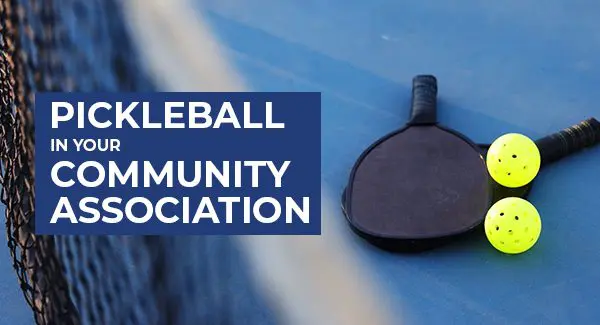- Community Associations, Board Member 101
- Wisconsin, Indiana, Illinois, Florida
Pickleball is sweeping the nation as a popular activity for all ages. It’s one of the fastest growing sports with over 8 million estimated pickleball players in the US.
Before jumping on the bandwagon, consider whether your condominium, homeowner (HOA), or townhome community association has the space, budget, and interest to support a pickleball court.
Below are ten considerations for board members, property managers, and community association leaders.
1. Community Needs
Board members need to consider the community’s interest in pickleball courts by assessing demand and ensuring that the addition aligns with the association’s overall needs and aesthetics.
Surveying residents can provide valuable insights into whether adding pickleball would be a worthwhile investment.
2. Evaluating Space
Whether you’re building new standalone pickleball courts or converting existing tennis courts, space is also a major factor.
Board members need to consider the available space for construction while ensuring regulatory guidelines and safety standards. They must also evaluate the impact on existing amenities, fencing, lighting, and parking.
3. Balancing the Budget
While keeping pickleball court construction or conversion costs within the budget is important, don’t compromise on quality. Poor construction can lead to higher maintenance costs in the long run. Careful association financial planning can help balance these aspects effectively.
4. Working with Vendors
Selecting the right vendors for pickleball court construction or conversion is crucial. Ensure that you have clear agreements and maintain open lines of communication. Work with your association’s attorney as you evaluate vendor bids, review contracts, check references, confirm contractor licensing, and insurance coverage
5. Navigating Building Regulations
Installing a pickleball court isn’t just a matter of space and interest. You’ll need to navigate local zoning laws and building codes. Consulting with legal and construction experts can help ensure that your pickleball project complies with all relevant regulations and avoids costly mistakes.
6. Ensuring Accessibility
Make sure that your pickleball courts and other association amenities are accessible to all residents, including those with disabilities. This not only creates a more inclusive community but also ensures compliance with laws like the Americans with Disabilities Act (ADA).
7. Managing Noise
When addressing noise issues related to building pickleball courts or converting tennis courts, board members should consider designating specific hours of use to minimize disturbance. For example, pickleball court access may be limited or prohibited during early mornings and late evenings.
Implementing soundproofing measures can also reduce the impact of noise on nearby residents. This can include acoustic barriers or strategic landscaping.
Additionally, the placement of the courts should be thoughtfully considered, ideally situating them away from the most noise-sensitive areas.
8. Managing Court Availability and Scheduling
To maximize enjoyment and minimize conflicts, implement a fair system for pickleball court usage. This might include a reservation system or scheduled play times to ensure that all interested association residents get a chance to play.
9. Pickleball Court Maintenance
A pickleball court is an investment that requires ongoing maintenance. There are different upkeep responsibilities involved whether it’s an indoor or outdoor court. Or whether the courts are made of asphalt, concrete, hardwood, or other materials.
From surface repairs to regular cleaning to weather conditions, maintaining the court is vital to ensure its longevity and continued enjoyment by association residents.
10. Insurance and Legal Concerns
Beyond zoning and permitting issues, board members must also review and possibly update the community’s insurance coverage to account for potential pickleball injuries and liabilities.
The association’s attorney can also help establish clear rules and regulations including allowing guests, permitting pets on the courts, noise complaints, property damage, and more.
Proactively addressing access and usage can minimize risks and protect the association from potential legal disputes arising from accidents or misuse of the pickleball courts.
Legal Resource
Managing a condo association or homeowners association (HOA) is no small task. Volunteer board members are often thrust into complex decision-making roles that affect their communities while balancing issues including budgeting, legal liabilities, and vendor relationships.
It’s critical to understand the nuances of community management, especially regarding association amenities like pickleball courts.
Review these considerations with fellow board members and your association’s attorney and as you work to foster a positive, engaging, and well-maintained community for all residents.
Legal questions about pickleball courts? Please call 855-537-0500 or visit www.ksnlaw.com.
Since 1983, KSN has been a legal resource for condominium, homeowner, and townhome associations. Additionally, we represent clients in real estate transactions, collections, landlord/tenant issues, and property tax appeals. We represent thousands of clients and community associations throughout the US with offices in several states including Florida, Illinois, Indiana, and Wisconsin.
Please note the material contained in this article is for educational and informational purposes only and does not constitute legal advice. No attorney-client relationship is established by your review or receipt of the information contained in this article. You should not act on the information discussed in this article without first obtaining legal advice from an attorney duly licensed to practice law in your State. While KSN has made every effort to include up-to-date information in this article, the law can change quickly. Accordingly, please understand that information discussed in this article may not yet reflect the most recent legal developments. Material is not guaranteed to be correct, complete, or up to date. KSN reserves the right to revise or update the information and statements of law discussed in the article law at any time, without notice, and disclaims any liability for your use of information or statements of law discussed on the article, or the accessibility of the article generally. This article may be considered advertising in some jurisdictions under applicable law/s and/or ethical rules/regulations. © 2024 Kovitz Shifrin Nesbit, A Professional Corporation.


